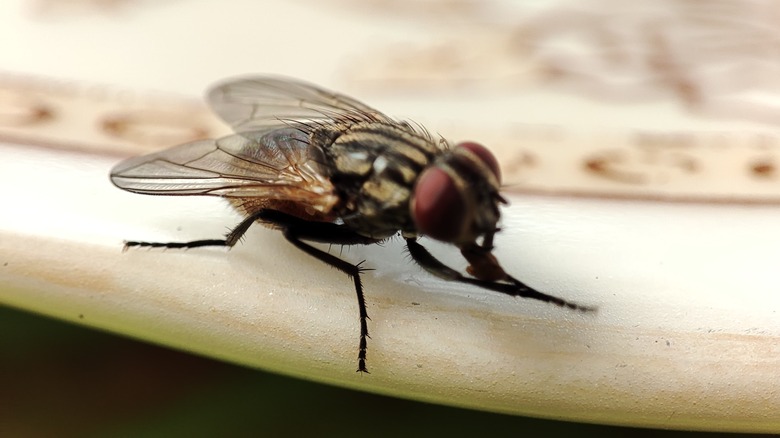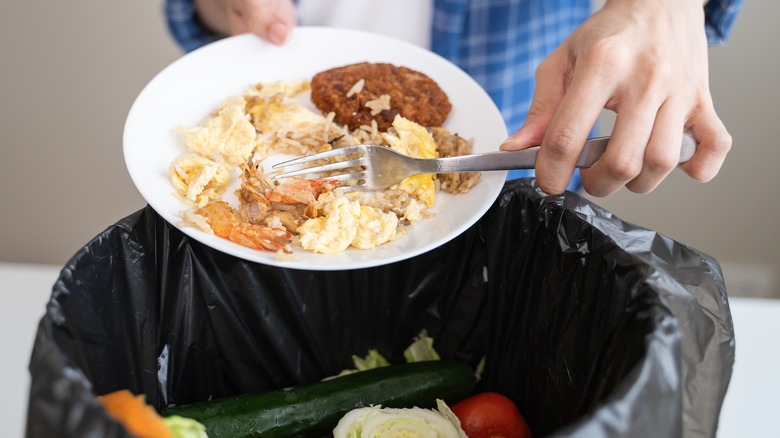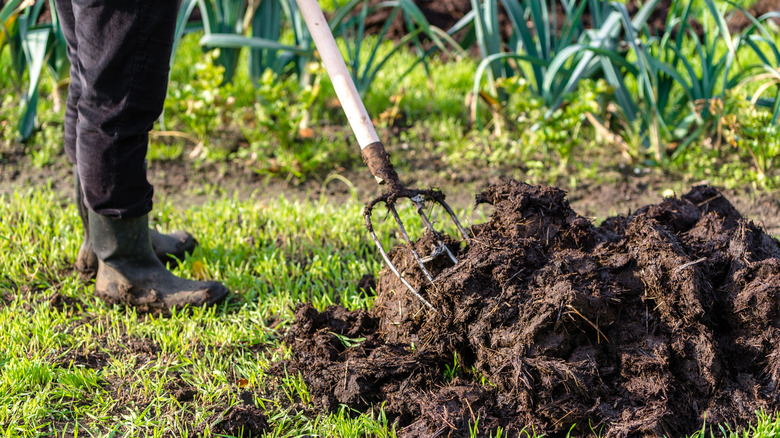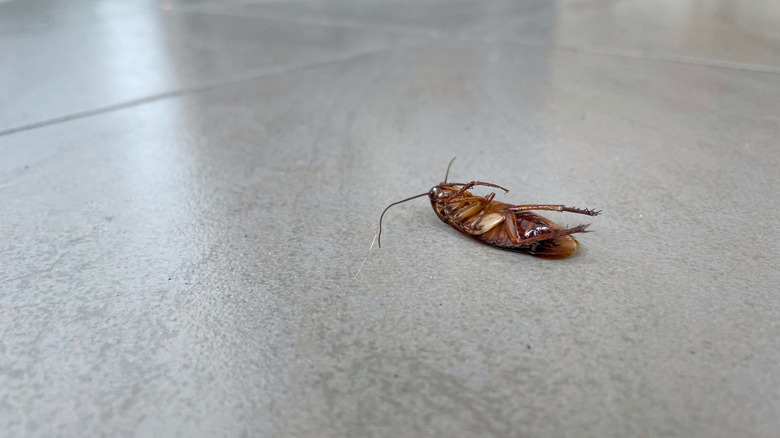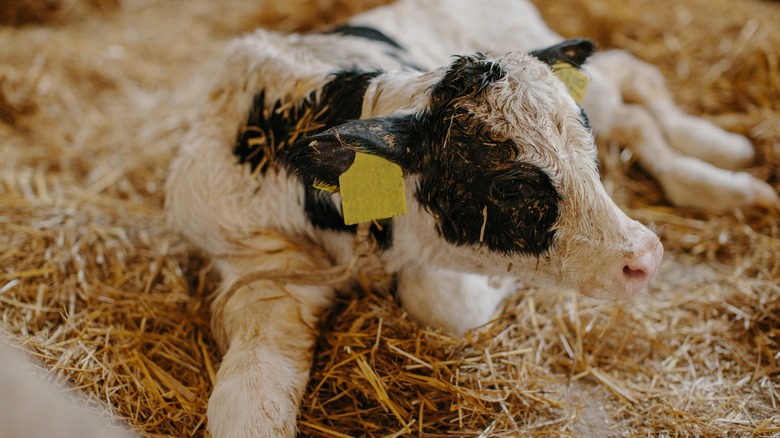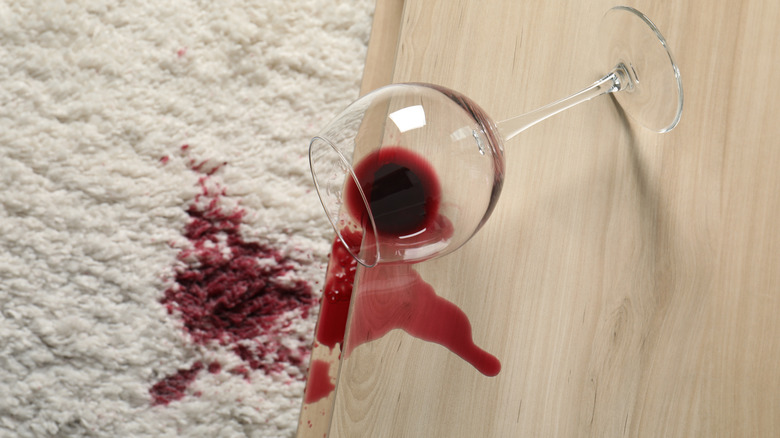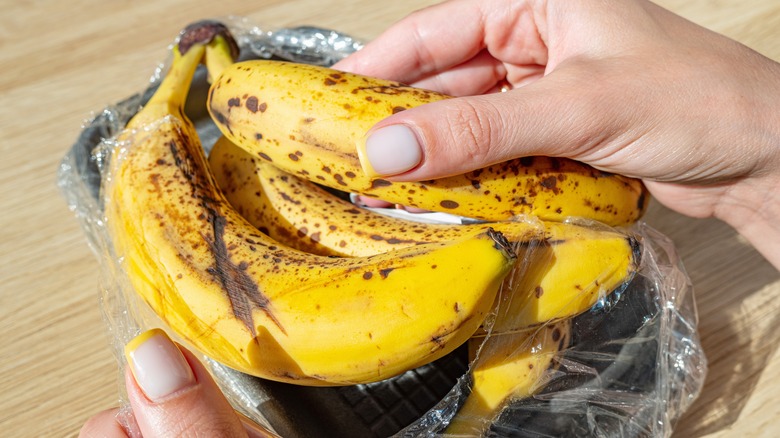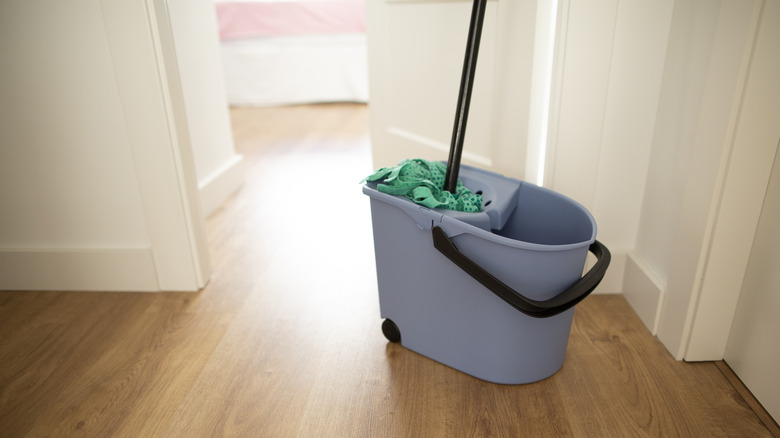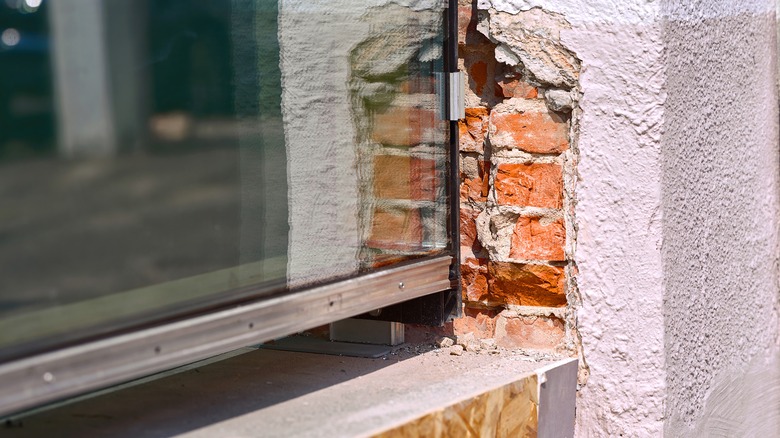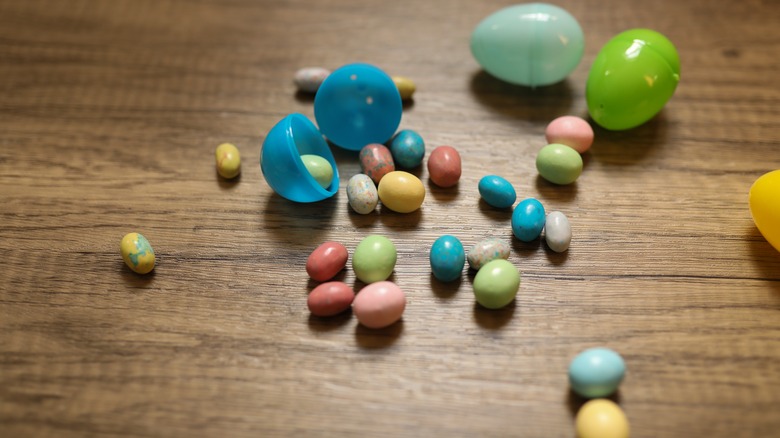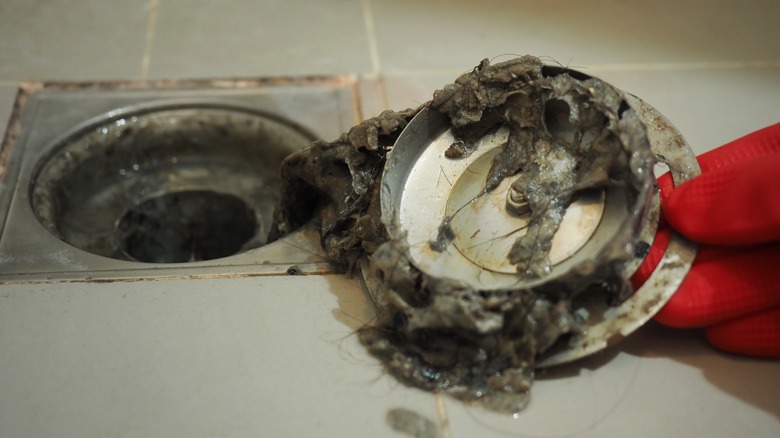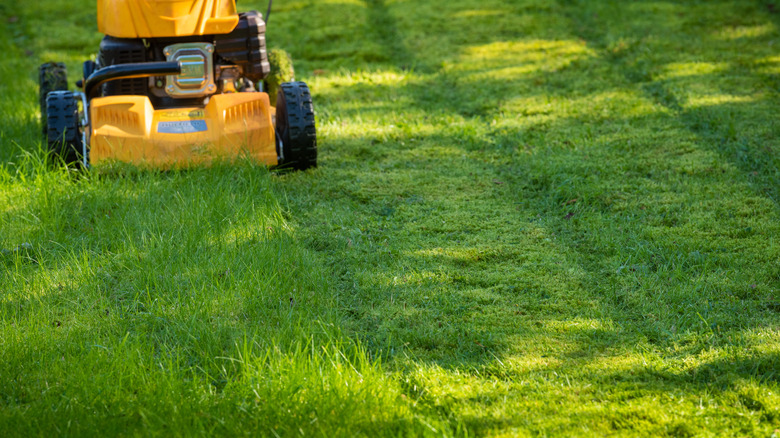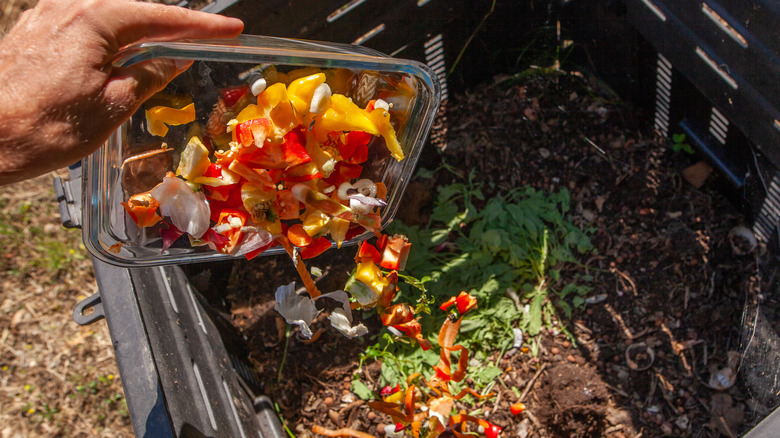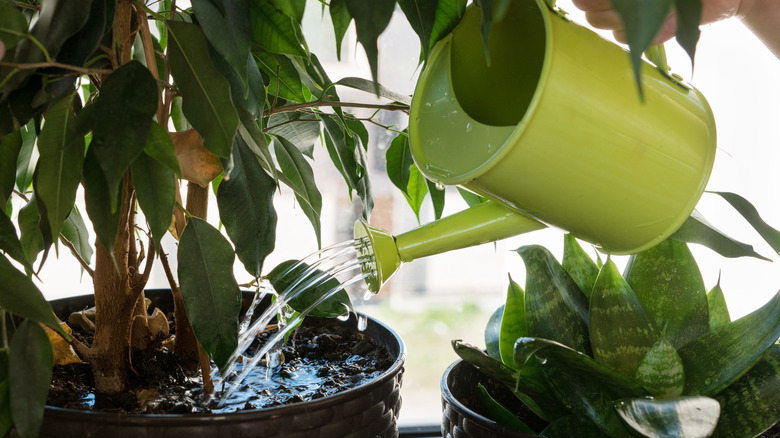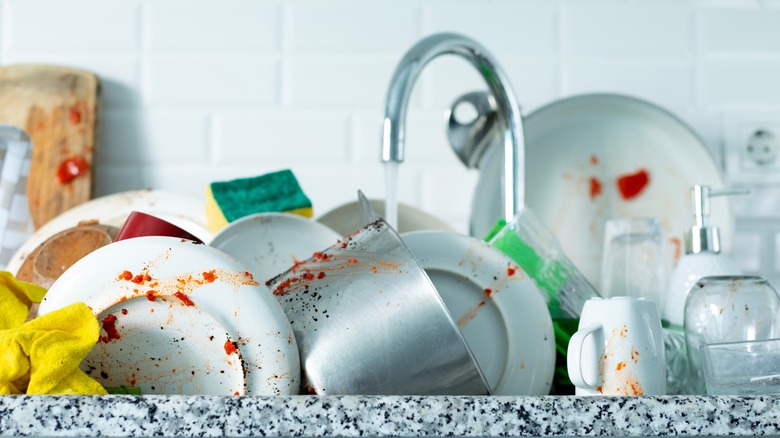17 Common Issues In Your Home And Garden That Are Attracting Flies
It's uncanny how the coming together of little things like delicious food, a place to bear and nurture progenies, and a warm overwintering spot can leave you flailing about like an inopportunely placed windmill. You'll be waving arms or brandishing swatters around your head and food, trying to thwack away the annoying flies who have barged into your home. Clearly, the freeloaders must go and stay gone. However, in order to get rid of flies, it's important to understand what brought them inside in the first place. After all, if what attracts flies is eliminated, so will their company.
Unfortunately, there's plenty of stuff that grabs their attention, such as food leftovers, pet waste, garbage cans, leaky pipes, and certain flowers, as we underline below. Worse, you can't give up on the battle thinking they're short-lived and will be gone soon. Capable of copulating in about two minutes and depositing over 500 eggs in their max 25 days of living, houseflies can establish their legacy right in your room if given a chance — and they aren't alone. Fruit flies, drain flies, bottle flies, flesh flies, and myriad other 'filth flies' are in on the gatecrashing. Their worst offense? They carry diseases, including cholera, leprosy, yaws, tuberculosis, and many more. To get rid of them, it's crucial to know more about what problems are attracting them to your home so you can remove those items from your property.
1. Poorly-sealed garbage bins
Ever thrown garbage in the trash and left the bin uncovered while rushing to leave your abode? That's an unexpected way you're attracting maggots (flies' offspring) to your home. The decomposing food, such as sour milk, rotten meat, or plain old vegetables, let the flies know there are rations and it's a safe place to copulate. Next thing you know, the dumpster is swarming with flies! So, seal garbage bags and keep the cans shut, clean, and far away from your home. When cleaning garbage cans, don't pour the dirty water in your garden or they'll multiply.
2. Manure piles in the garden
There's a reason why you should think twice before using manure as fertilizer: it's a breeding ground for pathogens, and flies aren't far behind. Rows of un- or poorly-composted horse, cow, swine, sheep, poultry, and cattle manure serve as overwintering spots for houseflies who rely on the nutrients to pupate merrily. The situation worsens if the piles remain wet for extended periods. Hence, if you see filth flies becoming a problem, use fully composted manure and turn it over regularly. Alternatively, remove the piles before the breeding season kicks into full throttle.
3. Insect or animal cadavers
Think an unfortunate critter lost its life to pest control treatments, in a freak accident, or to age? That's great news for flesh, blow, and house flies. Be it your walls, attic, garden, chimney, loft, or anywhere else where insects, birds, mice, or raccoons tread or inhabit, flies will find them and lay their eggs on their decaying bodies. Then, the maggots will feed, mature, and earn their proud batch of being a "future irritant." Ensure you safely relocate the source before the maggots pose more trouble.
4. Pet waste in your yard
Curiously, common flies did not start off by treating garbage as their precious steak – animal feces have this honor. Therefore, every time your dearest pets do their business, be it in the lawn or designated spaces, and you fail to pick up after them, your lawnmower isn't the lone victim. You become one too, for flies love using pet waste as food and an egg depository. Besides being a nuisance, if they convene right after on your food, anything from dysentery to food poisoning becomes fair game. So, clean up your pet's excrement immediately.
5. Animal feed and straws
If you're into rearing poultry, cattle, horses, or any livestock, your house might sooner or later become deluged with flies. That's because the mountains of animal feed and straws provide top-notch procreation grounds for house flies with moisture adding to the problem. Give or take a week, and the maggots are ready to soar and ace the adulting lesson to annoy anything and anyone within their ambit. The way out? Switch out the straw for other, drier bedding options, such as shredded newspapers, sawdust, or wood shavings. Also, avoid spilling the feed.
6. Fermented drink spillage
Regardless of whether you've hopped on the health-consciousness train and developed a taste for kombucha or have stuck your guns to the age-old ways of wine and cheese, flies will adapt to anything as long as it promises fermentation. That's also why they won't let you watch the soccer match in peace; they want that beer. So, clean up those spills timely and toss the bottles out after washing and rinsing them clean. Otherwise, flies won't waste a second lapping it all up and performing loop-de-loops in your living room like an intoxicated drunk.
7. Overripe food products
What you see in a fresh produce market is probably what you'll get back home if you dither on finishing off the bananas, potatoes, or any other ripe foodstuff: a miniature rave by fruit or house flies. Usually, they've already latched onto fruits as eggs and grow unabated if the produce isn't washed. To address the problem, consume the fruits and veggies on time after cutting out any damaged or wounded parts, lest they contain larvae. If that's not possible, refrigerate them to stave off premature rotting and promptly dispose of items past saving.
8. Cleaning items
Dirt, especially when wet, means the world to flies who take it as flavorsome, organic food for themselves and their forthcoming babies. No wonder they dart around cleaning items, especially cleaning dusters and floor mops every chance they get, particularly when they're soaking wet and when you've dithered on rinsing them out. They have no qualms about hoarding the wet lint lying unattended and uncared for underneath the washing machine. Want to show the flies the door and keep it shut? Cleaning your tools and hanging mops upside down to dry is a good start.
9. Gaps and crevices
Sometimes, the reason flies have made inroads has nothing to do with you missing out on the things in your family room you should be cleaning weekly. Instead, it could be as simple as them chancing upon the various gaps, fractures, openings, and crannies concentrated around your home's windows and doors. So, how can you protect your home? Break out the caulk gun and weatherstripping and get down to sealing. Also, consider installing tight-fitting screens — 16 mesh will do the job — over your windows as your own spin on the "show your IDs for entry" moment.
10. Sugary consumables
Like some of us, house and fruit flies have a penchant for all things fructose. In fact, as per the IFAS Extension, adult flies can extend their lives by gorging on sweet things. Obviously, if consumed in excess, they'll become obese, too, although that's beside the point. Simply put, if you've spilled soda, coke, candy, or fruit juice on your countertop, backsplash, or around the refrigerator and let it sit, you can't really blame the thirsty two-winged insects for wanting a drink. But feel free to gloat about them jumping head-first into your DIY fly trap.
11. Mucked-up drains
Have you ever wondered what the viscous film in your sink or storm drain feels like? Because drain, fruit, and phorid flies have. Apparently, it's quite nutritious, too, considering their newly-hatched maggots survive on all that organic gunk. While their source is plain as a day in bathrooms and basements, it might not be the case in kitchens where other grimy reasons can originate. To know for sure, drape the drain in a plastic bag and check if it captures any grownups. If that's the case, pour hot water and a cleaner down the choked pipe.
12. Grass clippings left on the lawn
Although there are a plethora of benefits to leaving grass clippings on your lawn, the nutrient boost being foremost, this can attract flies if not done right. When fresh, wet grass trimmings are laid too thick (or not mixed with other organic amendments into the soil), their decomposition takes a while, which the flying critters take as a cue for a place apt for having babies. The occasional mildew makes the signal stronger. Their infestation is especially acute in peak summers, as the eggs hatch quicker in higher temperatures.
13. Compost or worm bins
The holy trinity of nitrogenous food, moisture, and warmth encourages female soldier flies to deposit their eggs in your compost, worm, or mulch piles and bins — although you won't notice this until the torpedo-shaped, brown larvae breed out. Usually, they stay put in their small world but may wade inside if the bins are placed closer to home, so rethink their positioning. Otherwise, turn the compost and introduce brown material, such as shredded paper or shed leaves, to counterbalance the green component and raise heat levels. Also, ensure kitchen waste is buried deep within.
14. Water pooling and/or seepage
Having a puddle of water anywhere is akin to laying down a welcome mat for fruit and drain flies. While chances are your mind will first drag you to pipes and drains around the sink or septic tanks to look for leakages, it could also be something as benign as the pooling water in your houseplants. Similarly, water collecting around your humidifiers, freezers, fridges, air conditioners, toilet tanks, or bathtubs can serve as sources. Even ill-maintained bird baths and rain barrels can be hogged for procreation. Don't shirk on cleaning for good fly riddance.
15. Outdoor and indoor lights
When it's getting dark but the flies are out, they crave light (as anyone in that situation really would) and will flock to it when they see it. You've probably already encountered their hoard around your patio lights or lampshades. No, it's not only the moths; house and phorid flies are just as attracted. Surprisingly, they aren't without their preferences. For instance, fruit flies gather around UV but not green light, which explains the recent stream of fly traps. Regardless, turn off the lights when not in use or swap in warm, yellow lights or LEDs.
16. Left out dirty dishes
The "I'll do it later" pile sitting in your kitchen sink is doing you no favors, though the flies are jubilant. Food residue is a source of nourishment; the sooner the flies are deprived of it, the better off your home will be. The same goes for pet bowls, grills, and bird feeders unless you want the critters to dine on the remnants of a good meal sitting cute for pickings on the ground. Build a routine of at least rinsing off the plates before retiring for the day and rake the mess under feeders weekly.
17. Garden flowers
Not all flies gravitate to refuse. Some adults, like hoverflies, want flowers for themselves to drink the heavenly nectar that they pay back for by pollinating the plants as the spring spools in, quite reliably at that. Generally, they're good to have in your garden, both for pollination and pest control. But if you're worried about them moving indoors and setting up shop, move white-flowered or malodorous plants, especially from the Rose and Aster families, away from doors and windows, as they highly favor them.
